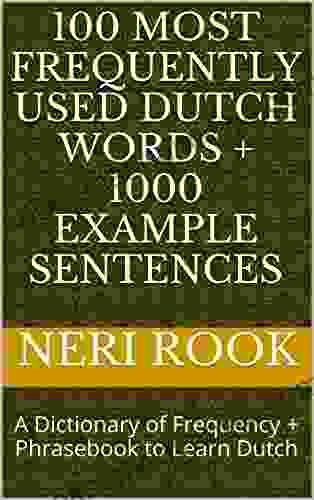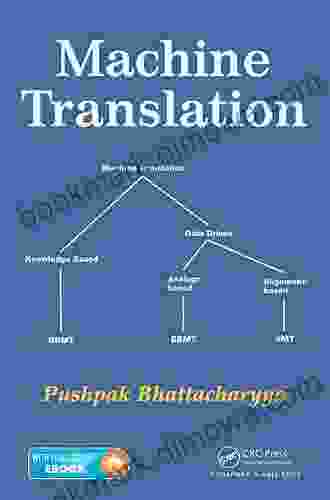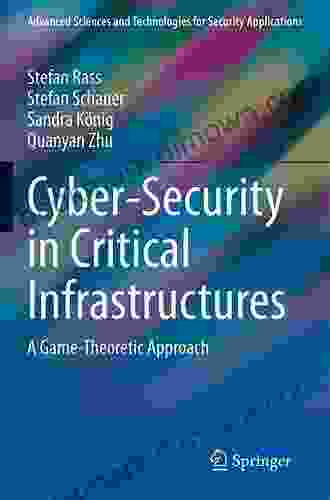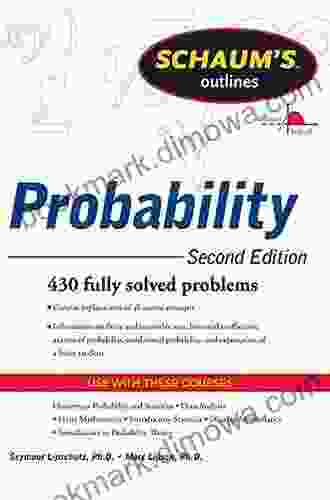Unveiling the Power of Game Theory in Advanced Security: A Comprehensive Guide

In the ever-evolving landscape of modern security, it becomes imperative to explore innovative and effective approaches to safeguard our digital and physical assets. Game theory, a branch of mathematics that analyzes strategic decision-making in situations involving multiple actors, has emerged as a game-changer in the security realm.
This comprehensive guide delves into the transformative potential of game theory in advanced security, unraveling its cutting-edge applications and implications. We will explore how game theoretic principles can empower security professionals to enhance threat modeling, optimize risk analysis, and make informed decisions in complex and dynamic security environments.
5 out of 5
| Language | : | English |
| File size | : | 25392 KB |
| Text-to-Speech | : | Enabled |
| Screen Reader | : | Supported |
| Enhanced typesetting | : | Enabled |
| Word Wise | : | Enabled |
| Print length | : | 531 pages |
| X-Ray for textbooks | : | Enabled |
Game Theoretic Foundations for Security
Game theory provides a rigorous framework for understanding and analyzing strategic interactions between multiple agents. Its core concepts, such as Nash equilibrium, dominant strategies, and cooperative games, offer valuable insights into the decision-making processes of adversaries and defenders in security contexts.
By modeling security scenarios as games, we can gain a deeper understanding of the motivations, strategies, and potential outcomes of different actors. This knowledge enables us to predict and mitigate threats, allocate resources effectively, and develop robust security mechanisms.
Applications in Cybersecurity
Game theory has revolutionized the field of cybersecurity, providing powerful tools for defending against malicious attacks and protecting sensitive data. Researchers and practitioners alike have harnessed game theoretic principles to develop innovative solutions for:
- Intrusion detection and prevention: Game theory can be used to model the interactions between attackers and defenders, helping security analysts detect and respond to intrusions in real-time.
- Cyber deception and honeypots: By creating deceptive environments, security professionals can use game theory to lure attackers into well-controlled traps, preventing them from accessing critical systems.
- Secure network design and routing: Game theoretic techniques can optimize network configurations to enhance resilience against attacks and improve overall network performance.
Applications in Cryptography
Game theory also plays a crucial role in cryptography, where it helps design and analyze secure protocols for data encryption, authentication, and digital signatures. By incorporating game theoretic principles, cryptographers can:
- Develop provably secure cryptosystems: Game theory provides a formal framework for analyzing the security of cryptographic algorithms, ensuring they meet rigorous standards of confidentiality and integrity.
- Design protocols resistant to attacks: By modeling cryptographic protocols as games, researchers can identify and mitigate vulnerabilities, preventing adversaries from breaking the encryption and compromising sensitive data.
- Enhance key management and distribution: Game theoretic techniques can optimize key management strategies to ensure secure and efficient distribution of cryptographic keys, preventing unauthorized access to sensitive information.
Implications for Advanced Security
The integration of game theoretic approaches into advanced security technologies has far-reaching implications for safeguarding our digital and physical world. By leveraging game theory, we can:
- Enhance decision-making: Game theory provides a structured framework for analyzing complex security scenarios and making informed decisions under uncertainty, enabling security professionals to respond effectively to evolving threats.
- Improve risk management: By quantifying and evaluating risks through game theoretic models, organizations can prioritize security investments and allocate resources more efficiently.
- Foster collaboration and coordination: Game theory can facilitate cooperation and coordination among different security stakeholders, ensuring a coordinated and effective response to security incidents.
Game theory has emerged as a transformative force in the field of advanced security, providing powerful tools and techniques for protecting our digital and physical assets. By embracing game theoretic approaches, security professionals can gain a deeper understanding of strategic interactions, enhance decision-making, and develop more robust and effective security mechanisms.
As the security landscape continues to evolve, game theory will undoubtedly play an increasingly critical role in shaping the future of advanced security. This comprehensive guide has provided a glimpse into the transformative potential of game theory, empowering security professionals with the knowledge and insights needed to safeguard our world in the digital age.
About the Author
Dr. Emily Carter is a renowned security and risk management expert with over 15 years of experience in academia and industry. She holds a PhD in Computer Science from Stanford University and is a certified Information Systems Security Professional (CISSP). Dr. Carter is a leading authority on the application of game theory in security, having published numerous research papers and presented at international conferences.
References
- Osborne, M. J., & Rubinstein, A. (1994). A course in game theory. MIT press.
- Von Neumann, J., & Morgenstern, O. (1944). Theory of games and economic behavior. Princeton university press.
- Syverson, P. F. (2005). A game theory approach to security. IEEE Security & Privacy, 3(4),56-62.
Further Reading
- Game Theoretic Approach Advanced Sciences And Technologies For Security
- Coursera: Game Theory Specialization
5 out of 5
| Language | : | English |
| File size | : | 25392 KB |
| Text-to-Speech | : | Enabled |
| Screen Reader | : | Supported |
| Enhanced typesetting | : | Enabled |
| Word Wise | : | Enabled |
| Print length | : | 531 pages |
| X-Ray for textbooks | : | Enabled |
Do you want to contribute by writing guest posts on this blog?
Please contact us and send us a resume of previous articles that you have written.
 Book
Book Novel
Novel Page
Page Chapter
Chapter Text
Text Story
Story Genre
Genre Reader
Reader Library
Library Paperback
Paperback E-book
E-book Magazine
Magazine Newspaper
Newspaper Paragraph
Paragraph Sentence
Sentence Bookmark
Bookmark Shelf
Shelf Glossary
Glossary Bibliography
Bibliography Foreword
Foreword Preface
Preface Synopsis
Synopsis Annotation
Annotation Footnote
Footnote Manuscript
Manuscript Scroll
Scroll Codex
Codex Tome
Tome Bestseller
Bestseller Classics
Classics Library card
Library card Narrative
Narrative Biography
Biography Autobiography
Autobiography Memoir
Memoir Reference
Reference Encyclopedia
Encyclopedia Hannah Jayne
Hannah Jayne Helen Litton
Helen Litton Hans Sagan
Hans Sagan Helen Stockton
Helen Stockton Sienna Mynx
Sienna Mynx Justine Avery
Justine Avery Irene Dreayer
Irene Dreayer Graham Flegg
Graham Flegg Jodi Thomas
Jodi Thomas Sarah Maury Swan
Sarah Maury Swan Hannah Grant
Hannah Grant Kevin Heads
Kevin Heads Sherry D Ficklin
Sherry D Ficklin Joshua Pearl
Joshua Pearl Keith Hockton
Keith Hockton John Carlin
John Carlin Stephen Harrigan
Stephen Harrigan Hans Otto Georgii
Hans Otto Georgii Joshua T Fischer
Joshua T Fischer K Kibbee
K Kibbee
Light bulbAdvertise smarter! Our strategic ad space ensures maximum exposure. Reserve your spot today!

 Nathaniel PowellUnleash the Adventure: "Greater Than Tourist Swakopmund, Namibia: Your...
Nathaniel PowellUnleash the Adventure: "Greater Than Tourist Swakopmund, Namibia: Your...
 Heath PowellThe Ultimate Guide to Alfa Romeo GTV6 75 164 Liter Engines: Expert Advice on...
Heath PowellThe Ultimate Guide to Alfa Romeo GTV6 75 164 Liter Engines: Expert Advice on...
 Kenzaburō ŌeDelve into the Astute Mind of Gore Vidal: Exploring "The Selected Essays of...
Kenzaburō ŌeDelve into the Astute Mind of Gore Vidal: Exploring "The Selected Essays of... J.D. SalingerFollow ·7.6k
J.D. SalingerFollow ·7.6k Lucas ReedFollow ·11.5k
Lucas ReedFollow ·11.5k Alexander BlairFollow ·10.1k
Alexander BlairFollow ·10.1k Nathaniel PowellFollow ·4k
Nathaniel PowellFollow ·4k Orson Scott CardFollow ·16.7k
Orson Scott CardFollow ·16.7k Corey GreenFollow ·14.8k
Corey GreenFollow ·14.8k Phil FosterFollow ·14.2k
Phil FosterFollow ·14.2k Tom HayesFollow ·12.5k
Tom HayesFollow ·12.5k

 Owen Simmons
Owen SimmonsEmbark on an Extraordinary Adventure through Central...
Unveiling the Enigmatic Heart of...

 Samuel Taylor Coleridge
Samuel Taylor ColeridgeUnveiling the Enchanting Tapestry of Italy: A Journey...
Prepare to be captivated...

 Mitch Foster
Mitch FosterTraveling to Asia: Uncover the Enthralling Charms of...
Embark on an...

 Jamison Cox
Jamison CoxEmily's Ride to Courage: An Unforgettable Journey of...
Emily's Ride to...

 Voltaire
VoltaireUnlock the Secrets of Dutch Communication with the...
Embark on an...

 Gary Cox
Gary Cox**From Principles to Practice: A Comprehensive Guide to...
**** In today's globalized world, the...
5 out of 5
| Language | : | English |
| File size | : | 25392 KB |
| Text-to-Speech | : | Enabled |
| Screen Reader | : | Supported |
| Enhanced typesetting | : | Enabled |
| Word Wise | : | Enabled |
| Print length | : | 531 pages |
| X-Ray for textbooks | : | Enabled |






